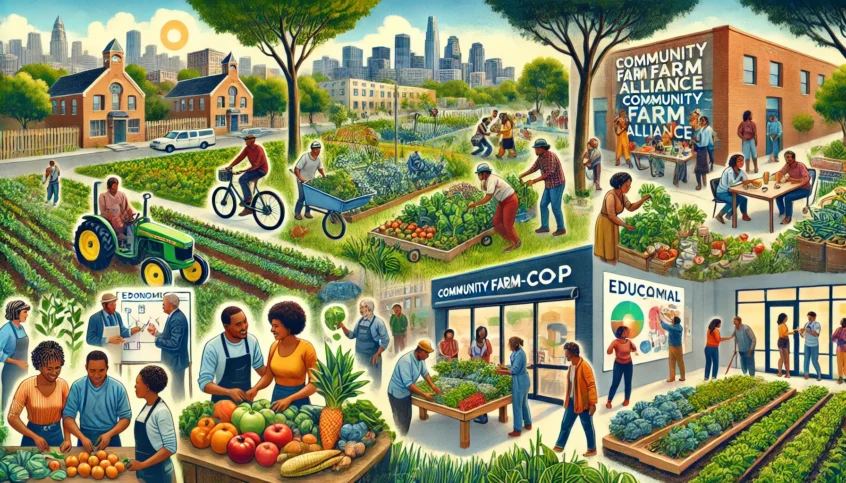Introduction
In a world where food insecurity and economic disparities are prevalent, community organizing has become a vital tool for fostering sustainable development and empowering local communities. When I was a community organizer at the Community Farm Alliance (CFA) stands we were a beacon of hope, leveraging innovative initiatives to address these critical issues. This blog post explores my role as a community organizer at CFA in promoting sustainable development, highlighting specific projects such as urban farming initiatives and food co-ops that have successfully tackled food insecurity and spurred economic growth. We will delve into the strategies employed by the CFA to engage and mobilize community members and examine the positive impact these initiatives have had on local economies and residents’ quality of life.
The Role of Community Farm Alliance
The Community Farm Alliance is dedicated to creating resilient and equitable food systems by supporting local farmers, promoting sustainable agriculture, and empowering communities. Through a combination of advocacy, education, and grassroots organizing, CFA works to ensure that everyone has access to healthy, affordable food and the opportunity to participate in their local food economy.
Key Initiatives and Projects
1. Urban Farming Initiatives
Urban farming has become a cornerstone of CFA’s efforts to combat food insecurity and promote sustainable development. By transforming vacant lots and underutilized spaces into productive urban farms, CFA not only increases access to fresh produce but also creates green spaces that enhance urban environments.
Case Study: The Green City Growers
In partnership with local governments and community organizations, CFA launched the Green City Growers initiative in a major metropolitan area. This project converted several abandoned lots into thriving urban farms, providing fresh produce to local residents and creating job opportunities for community members.
Key Strategies:
- Community Involvement: From the planning stages to the daily operations, community members were actively involved in the project, ensuring that the farms met local needs and preferences.
- Education and Training: CFA offered workshops and training programs on urban farming techniques, enabling residents to gain valuable skills and contribute to the success of the farms.
- Partnerships: Collaborations with local schools, nonprofits, and businesses provided additional resources and support, amplifying the project’s impact.
2. Food Co-ops
Food cooperatives (co-ops) are another vital component of CFA’s strategy to address food insecurity and promote economic growth. By establishing community-owned grocery stores, CFA helps ensure that residents have access to affordable, high-quality food while also keeping profits within the community.
Case Study: The Harvest Co-op
The Harvest Co-op was established in a rural area where access to fresh food was limited. With the support of CFA, local residents came together to create a co-op that not only provided healthy food options but also served as a community hub for social and economic activities.
Key Strategies:
- Member Engagement: The co-op operated on a member-owner model, with local residents buying shares and having a say in the store’s operations and policies.
- Local Sourcing: The co-op prioritized sourcing products from local farmers and producers, supporting the regional economy and ensuring fresh, seasonal produce.
- Community Programs: The Harvest Co-op hosted cooking classes, nutrition workshops, and community events, fostering a sense of community and promoting healthy lifestyles.
Strategies for Engaging and Mobilizing Community Members
The success of CFA’s initiatives is largely due to its effective strategies for engaging and mobilizing community members. Here are some key tactics employed by the alliance:
1. Grassroots Organizing:
CFA places a strong emphasis on grassroots organizing, empowering local leaders to spearhead initiatives and mobilize their communities. This bottom-up approach ensures that projects are community-driven and reflective of local needs.
2. Advocacy and Policy Work:
By advocating for policies that support sustainable agriculture and equitable food systems, CFA influences broader systemic change. This includes lobbying for land use policies that support urban farming and advocating for funding and resources for local food initiatives.
3. Education and Capacity Building:
CFA offers a range of educational programs and resources to build the capacity of community members and local organizations. This includes training on sustainable farming practices, business development for food entrepreneurs, and leadership development for community organizers.
4. Collaboration and Partnerships:
Collaborative efforts with local governments, nonprofits, schools, and businesses enhance the reach and impact of CFA’s initiatives. These partnerships provide additional resources, expertise, and support, making projects more sustainable and effective.
Positive Impact on Local Economies and Quality of Life
The initiatives spearheaded by the Community Farm Alliance have had a profound impact on local economies and residents’ quality of life. Here are some of the positive outcomes observed:
1. Economic Growth:
By creating job opportunities and supporting local food businesses, CFA’s projects stimulate economic growth. Urban farms and food co-ops provide employment for residents and create new markets for local farmers and producers.
2. Improved Access to Healthy Food:
CFA’s initiatives have significantly increased access to fresh, healthy food in underserved areas. This not only improves nutrition and health outcomes but also fosters a greater appreciation for locally grown produce.
3. Enhanced Community Cohesion:
Projects like urban farms and food co-ops serve as community gathering spaces, fostering social interaction and strengthening community bonds. These initiatives create a sense of ownership and pride among residents, enhancing overall community well-being.
4. Environmental Benefits:
By promoting sustainable agriculture practices, CFA’s initiatives contribute to environmental sustainability. Urban farms reduce the carbon footprint associated with transporting food, and organic farming practices improve soil health and biodiversity.
5. Educational Opportunities:
Through workshops, training programs, and community events, CFA provides valuable educational opportunities for residents of all ages. These programs empower individuals with knowledge and skills that can be applied to improve their own lives and their communities.
Conclusion
The Community Farm Alliance’s commitment to sustainable development and community empowerment serves as a model for addressing food insecurity and fostering economic growth. By leveraging the power of community organizing and innovative initiatives like urban farming and food co-ops, CFA has created lasting positive impacts on local economies and residents’ quality of life.
Call to Action
Inspired by the work of the Community Farm Alliance? You too can make a difference in your community! Whether you are an individual passionate about sustainable development, a local leader looking to mobilize your community, or an organization seeking to collaborate on impactful projects, there are many ways to get involved.
Visit the Crowd-Max website to learn more about their initiatives, explore volunteer opportunities, and discover how you can support their mission. Together, we can build resilient, equitable food systems and empower communities to thrive.

